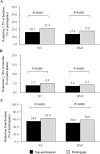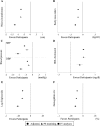Effectiveness of nationwide screening and lifestyle intervention for abdominal obesity and cardiometabolic risks in Japan: The metabolic syndrome and comprehensive lifestyle intervention study on nationwide database in Japan (MetS ACTION-J study)
- PMID: 29315322
- PMCID: PMC5760033
- DOI: 10.1371/journal.pone.0190862
Effectiveness of nationwide screening and lifestyle intervention for abdominal obesity and cardiometabolic risks in Japan: The metabolic syndrome and comprehensive lifestyle intervention study on nationwide database in Japan (MetS ACTION-J study)
Abstract
Background: Lifestyle interventions can substantially improve obesity and cardiometabolic risks. However, evidence of long-term benefits of national intervention is sparse. We aimed to evaluate the long-term effectiveness of a nationwide program for abdominal obesity.
Methods: A retrospective cohort study was performed using a longitudinal nationwide individual data in subjects aged 40-74 years who underwent checkups in fiscal year (FY) 2008. Lifestyle interventions were provided via interview in subjects with abdominal obesity and at least one cardiometabolic risk factor. Subjects who attended the lifestyle intervention (participants) were compared to those who did not attend (non-participants). Outcomes were waist circumferences (WC) and body mass index (BMI) reduction, reversal of metabolic syndrome (MetS), and changes in cardiometabolic risks. We used a three-step process with robust analytic approaches to account for selection bias that included traditional multivariate analysis, propensity-score matching and instrumental variable (IV) analyses.
Results: Of 19,969,722 subjects, 4,370,042 were eligible for analyses; 111,779 participants and 907,909 non-participants. A higher percentage of participants had ≥5% reductions in obesity profiles at year 3, compared to non-participants (WC, 21.4% vs 16.1%; BMI, 17.6% vs 13.6%; p<0.001 each). Participants also had higher reversal for MetS (adjusted odds ratio 1.31; 95% confidence interval: 1.29-1.33; p<0.001). Greater reductions in cardiometabolic risks were observed in participants. Those results were confirmed in analyses using a propensity score-matched cohort (n = 75,777, each) and IV analyses. Limitations of this work include the use of non-randomized national data in Japan to assess the effectiveness of the nationwide preventive program.
Conclusions: In the nationwide lifestyle intervention for abdominal obesity, the at-risk population achieved significant reductions in WC, BMI, and cardiometabolic risks in 3 years. This study provides evidence that the nationwide program effectively achieved long-term improvement in abdominal obesity and cardiometabolic risks.
Conflict of interest statement
Figures



References
-
- Artinian NT, Fletcher GF, Mozaffarian D, Kris-Etherton P, Van Horn L, Lichtenstein AH, et al. Interventions to promote physical activity and dietary lifestyle changes for cardiovascular risk factor reduction in adults: a scientific statement from the American Heart Association. Circulation. 2010;122(4):406–41. doi: 10.1161/CIR.0b013e3181e8edf1 . - DOI - PMC - PubMed
-
- Moyer VA, Force USPST. Screening for and management of obesity in adults: U.S. Preventive Services Task Force recommendation statement. Annals of internal medicine. 2012;157(5):373–8. doi: 10.7326/0003-4819-157-5-201209040-00475 . - DOI - PubMed
-
- Rothman AJ. Toward a theory-based analysis of behavioral maintenance. Health Psychol. 2000;19(1 Suppl):64–9. . - PubMed
-
- Hu FB, Satija A, Manson JE. Curbing the Diabetes Pandemic: The Need for Global Policy Solutions. Jama. 2015;313(23):2319–20. doi: 10.1001/jama.2015.5287 . - DOI - PMC - PubMed
-
- Malik VS, Willett WC, Hu FB. Global obesity: trends, risk factors and policy implications. Nat Rev Endocrinol. 2013;9(1):13–27. doi: 10.1038/nrendo.2012.199 . - DOI - PubMed
Publication types
MeSH terms
LinkOut - more resources
Full Text Sources
Other Literature Sources
Medical

